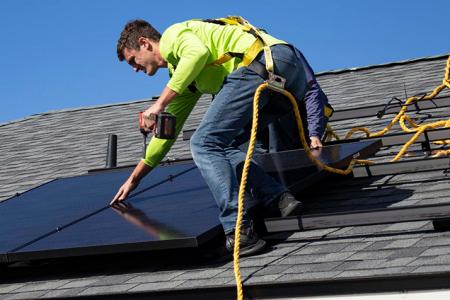Solar
What you need to know
Fossil fuels are limited, expensive, and produce harmful pollutants when burned to produce energy. The sun can provide renewable energy and hot water to our homes for low-cost and a low carbon footprint.
The 2 primary options for solar power are Solar Photovoltaic systems (Solar PV) and Solar Water Heating systems. Solar PV systems provide electricity to your home, whereas Solar Water Heating systems provide hot water (but not typically central heating).
Solar PV
Solar Photovoltaic energy, also known as Solar PV, is what most people think of when we talk about solar power. Solar PV systems use a network of solar panels to collect sunlight and convert it into electricity. This energy can be used to power our households and reduce our energy bills while significantly reducing our carbon footprint.
How they work
Solar PV systems work through a network of panels that have direct exposure to the sun. These panels are typically installed on the roof of your home but can be on ground level if they are still able to receive sunlight and are properly protected. These panels convert sunlight into electricity, which is then passed through an inverter to make it suitable for use in the home.
Benefits of Solar PV
Solar PV systems have a range of benefits for your home, your bills, and the environment:
- as solar energy is a renewable energy source, your carbon footprint is massively reduced
- by powering your home through solar energy, you save money on your monthly electricity bills
- any unused power is not wasted but sent back to the electricity grid – this energy can be sold back to the national energy companies through which means you make money on energy you do not use
- solar PV systems can increase the energy performance certificate (EPC) rating of your home
Things to consider
Before committing to a solar PV system for your home, there are a few things you should consider:
- solar water heating relies on consistent access to the sun to be most effective – a south facing roof with little to no shade will work best for providing maximum exposure to the sun
- in addition, your roof will need to be of a sturdy enough construction to withstand the increased load from your solar PV system
- while solar PV systems can provide high rates of energy at peak solar periods, this varies throughout the year – you’ll likely still need to rely on power from the electricity grid to run your home
- solar PV systems will need maintenance over time to run at maximum efficiency to ensure you are getting maximum usage out of your electricity, it is recommended that you also install a large battery to store power generated when you are not using it (this can increase initial set-up costs)
- purchase and installation costs for solar PV systems can be quite high if not assisted through a grant funding scheme
Solar water heating
Solar water heating systems use specially designed solar panels to provide hot water to your home. Relying on the sun for energy and heat, solar water heating systems are almost completely free to run. If your home is suitable, a solar hot water system can significantly reduce your energy consumption and carbon footprint.
How it works
Solar water heating systems are made up of panels or tubes that are installed on the roof of your home. Inside the panels or tubes are small pipes containing a liquid that easily collects and stores heat. As the sun shines on the panels, the liquid gets hot and is pumped through to a hot water tank inside your home. These pipes then warm up the water in your tank and return to the panels on your roof, where the cycle begins again.
Things to consider
If you think solar water heating might be right for your home, there are a few things to consider:
- solar water heating relies on consistent access to the sun to be most effective – a south facing roof with little to no shade will work best for providing maximum exposure to the sun
- because our national exposure to the sun varies, particularly in winter months, a solar water heating system is unlikely to be able to completely provide your hot water throughout the year – you may need an additional method, such as an electric immersion heater, to make sure you have access to hot water throughout the year.
- Solar water heating systems do not provide enough hot water to also heat your home – many people pair their solar water heating systems with another system, such as a heat pump, if they’re looking to move away from non-renewable energy sources.
- If your roof is suitable for solar water heating, it may be worth considering whether a solar electricity system (also known as Solar PV) would be a better option.
- any solar system will have an up-front cost for installation – you may wish to research grant funding options to assist with these costs
Biomass boilers
For some homes, a biomass boiler may be more suitable. A biomass boiler burns sustainable fuels (typically wood pellets) to heat up a hot water tank to provide a home with hot water and central heating.
When a biomass boiler may be right for you
For some properties, a biomass boiler could be effective when replacing a particularly inefficient fossil-fuel system such as a conventional boiler or oil boiler. This is because the fuel for a biomass boiler is typically sustainable. Sustainable fuel means that any fuel consumed is replaced by a renewable resource. In most cases, this is done by planting new trees to replace those cut down to fuel biomass boilers.
While biomass boilers are not typically cheaper to run than a conventional boiler system, they are significantly less impactful on the environment due to releasing less harmful gases into the environment.
Things to consider
While biomass boilers can be a great alternative to fossil fuel boilers, they require significantly more maintenance and there are multiple things you need to consider if you are thinking about buying one for your home:
- for the most cost-efficient way of running a biomass boiler, you will need a significant amount of dry space to store large amounts of fuel
- biomass boilers will need regular cleaning to make sure they stay safe and run at maximum efficiency
- If using poor quality, unseasoned wood and an inefficient biomass boiler, there can be health risks from polluting particles released into your home
A biomass boiler can be significant upfront cost (typically around £18,000 including installation) if eligible, you can receive financial assistance to upgrade from an inefficient fossil fuel system through the Boiler Upgrade Scheme.
Choosing the right system for you
Choosing the right system for you can be a difficult task. If you’re receiving a new heating system through a funded grant, such as the Warm Homes: Local Grant, your installer will work with you to assess your home and decide which option is right for you.
For most people, a heat pump will be the most efficient way to heat their home. However, to run at maximum efficiency a heat pump should be installed into a house with sufficient insulation.

